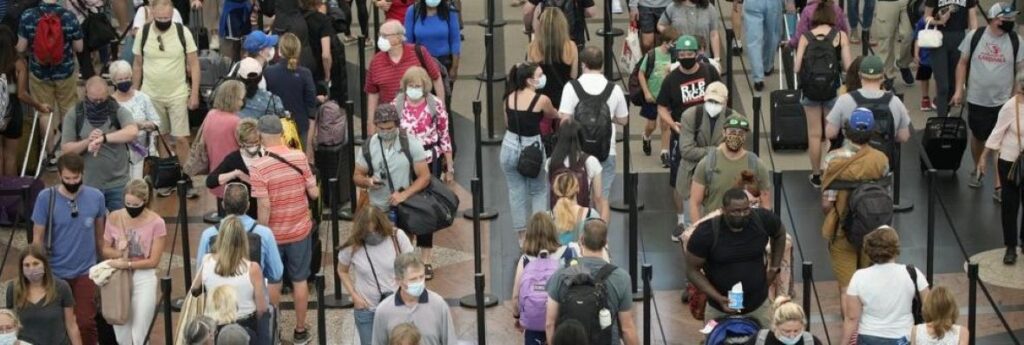The old adage that “getting there is half the fun” couldn’t be further from the truth for frustrated summer-vacation travellers south of the border who are facing delays and long line-ups at airports as US airlines struggle to keep up with new pandemic-era highs in passenger numbers. On Monday alone, American Airlines had cancelled 500 flights, or 16% of its schedule, by late afternoon.
Despite rising numbers of coronavirus infections fuelled by the delta variant, more than 2.2 million went through airport checkpoints on Sunday, according to the Transportation Security Administration, marking another recent high mark.
That is nearly 11,000 more people screened than July 18, and the highest number since Feb. 28, 2020, before the US felt the full brunt of the pandemic. However, air travel was still down 17% Sunday from the same Sunday in 2019.
The resurgence of leisure travel, coupled with some bad weather, has led to delays and flight cancellations at airlines struggling to ramp up after being crushed by the pandemic. Airlines have thousands fewer workers than they did before the pandemic, and at times they have been caught short-staffed even though they received US$54 billion in taxpayer money to keep employees on the payroll.
By midafternoon Monday, Spirit Airlines cancelled about 290 flights — more than one-third of its schedule — citing weather and “operational challenges.” That was after cancelling one-fifth of its flights Sunday. The Florida-based discount carrier was “working around the clock to get back on track,” spokesman Field Sutton said.
The disruptions created long lines at airport ticket counters in Orlando and Fort Lauderdale, Florida. Some stranded passengers speculated that the breakdown in service was caused by a strike or work slowdown, but the airline and labour unions said the rumor was false.
With other planes mostly full this summer, airlines are struggling to rebook passengers on cancelled flights.
David Snell, who runs an air-tour business in Dallas, was stuck in Detroit after American cancelled his Monday night flight home and emailed him a list of available flights — none of which were sooner than Wednesday. When Snell looked into Tuesday flights, he said prices started around $1,200 or 30,000 frequent-flyer points.
“They are absolutely gouging people who are trying to get home after cancellations,” Snell said. He said he called American three times and spent four hours on hold before buying a $308 one-way ticket on Southwest. “Everyone was left to fend for themselves.”
There have been at least 5,000 delayed flights on most days since early July, according to according to tracking service FlightAware figures. Southwest, American and Spirit are among airlines with the biggest problems. For Sunday and Monday combined, Southwest delayed more than 2,500 flights and American more than 1,600.
A key senator is quizzing several airlines to explain the high numbers of flight delays and cancellations. Sen. Maria Cantwell, D-Wash., chair of the Senate Commerce Committee, said airlines did a poor job of managing their workforces and might have failed to live up to the purpose of the taxpayer funding.
The travel recovery faces a renewed public-health threat, as the number of new cases of COVID-19 continues to rise. The seven-day rolling average of new US infections is around 80,000 a day, up nearly 150% from two weeks ago, although the increase in deaths is far smaller.
Airline officials say they haven’t seen bookings suffer because of the delta variant, although some have said it could delay the return of business travel, which airlines were hoping would gain speed this fall.
Passports
Meanwhile, understaffed US passport offices are also being overwhelmed by people ready to travel again as COVID-19 restrictions gradually have lifted in recent months.
The pent-up demand for passports has swelled wait times to between 12 and 18 weeks, according to the US State Department, which closed many of its offices last year in an effort to keep employees safe, creating an enormous backlog.
The department says a backlog of 1.5 million to 2 million passport requests means that most applications submitted now probably will not be processed until the fall. Americans needing to apply for or renew a passport are being advised to do so at least six months ahead of when they plan to travel.

